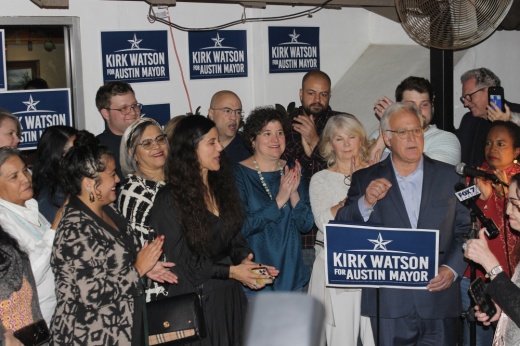Kirk Watson will be Austin’s next mayor and return to City Hall after two decades following his narrow win in December’s runoff election.
Watson, the former mayor and state senator, won the mayoral runoff with 57,346 votes, or 50.39%. His challenger, state Rep. Celia Israel, finished with 56,460 votes, or 49.61%. It is Watson’s third mayoral win in Austin and first since 2000.
All results are unofficial until canvassed.
The close December victory over Israel came after she led in the November general election with 40% of the votes to Watson’s 35%.
During an election night party at Santa Rita Cantina, Watson said he is looking forward to diving into his two-year term and working with his new colleagues on the council dais. He also stated his respect for Israel’s campaign and her voters.
“It’s important how we go about making a real difference at City Hall. We need to do it with immediacy and we need to do it quickly on issues of homelessness, public safety, transit, affordability ... and on other basics of city government that urgently need a restart,” he said.
The December mayoral runoff drew nearly 114,000 voters between Travis, Hays and Williamson counties. Nearly 306,000 people cast a vote in the mayor’s race during the November general election.
In Travis County, the mayor's race came down to a split between West Austin and some of downtown, where Watson carried most precincts, and the central and eastern portions of the city which backed Israel. That divide followed a similar breakdown in the general election.
Israel won Austinites' votes in Travis County by a slim margin, with 55,105 votes to Watson's 55,088. Watson's victory came thanks to voters in Hays and Williamson counties, where he beat Israel by around 900 total votes.
Posted 7:28 p.m.
Former Austin mayor and state Sen. Kirk Watson is leading in the race to become Austin's next mayor based on early voting results released shortly after 7 p.m. Dec. 13.
Watson leads his competitor state Rep. Celia Israel by a 4.24% margin, accounting only for votes that were cast during the early voting period that ran Dec. 1-9. In Travis and Williamson counties, Watson earned 38,717 early votes to Israel's 35,561. Hays County has not released early voting totals as of the last update.
In Travis County only, early voting results mirrored a trend between supporters of the two candidates that was on display in the November general election. Watson carried precincts mainly in West Austin, including portions of downtown, while Israel voters were largely located in the city's central and eastern portions.
Election day results will be released through the night. All results are unofficial until canvassed.
Watson and Israel made it to Austin's mayoral runoff after each won more than one-third of the city's vote and beat out four other candidates in the November general election. The two established Democrats appeared to be mayoral front-runners throughout this year as they raised nearly $2.5 million and spent more than $2 million combined on their campaigns.
Either Watson or Israel will arrive at City Hall for a limited two-year term after Austinites voted to move mayoral elections to presidential election years following this year's contest. The winner will still be eligible to run again in 2024.
Austin's next mayor will preside over a new City Council next year, with Mayor Steve Adler and council members Pio Renteria, Ann Kitchen and Kathie Tovo all leaving office with their 35 years of combined experience in January. The end of their terms also marks the end of Austin's first-ever 10-1 council based on geographic districts that was established in 2014, replacing the city's former at-large system of representation.
Both candidates ran on platforms heavily featuring housing policy, likely to remain a key political issue in Austin for years to come as debates about addressing the local affordability crisis and development in the city continue. Israel and Watson also ran on their years of legislative experience at the Texas Capitol and their desires to help shape Austin as it continues its rapid growth.
Other topics in focus through their campaigns included the billions of dollars in new transportation projects coming to town, Austin's homeless response system, city budgeting and taxing, and oversight of city staffing and basic public functions.





